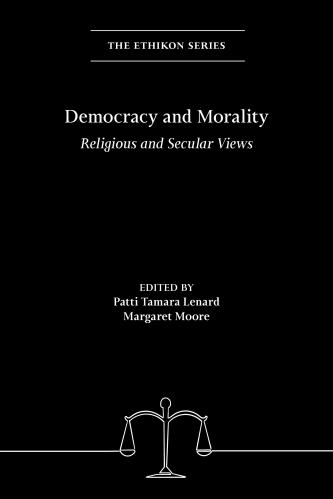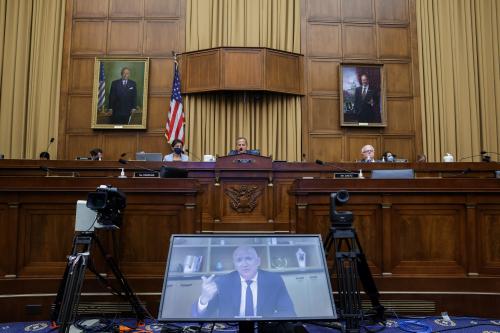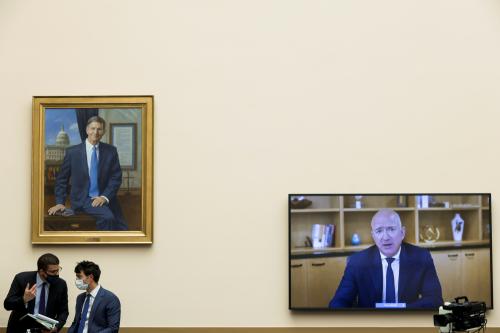The Democratic majority staff report on competition in digital markets from the House Subcommittee on Antitrust is a timely and persuasive call to action for the next Congress and administration. It updates progressive thinking on how to bring giant corporations under social control through law and regulation with its pragmatic blend of behavioral and structural measures aimed at creating and maintaining robust competition in key digital markets.
Progressive reformers seem torn between breaking up today’s tech titans or regulating their anticompetitive conduct. Many including Senator Elizabeth Warren, Facebook co-founder Chris Hughes, and antitrust scholars Tim Wu and Lina Khan seem to prefer a breakup. Others including former Chair of the Council of Economic Advisors Jason Furman, public interest advocate Harold Feld, Yale University economist Fiona Scott Morton, former Justice Department and State Department official Phil Verveer, and former Chair of the Federal Communications Commission Tom Wheeler call for a specialist agency to regulate the tech giants. The EU seems to be moving quickly toward the regulatory approach in its call for ex ante competition rules.
The House report asks, in effect, why not do both? It recommends separation of digital platforms from commerce and discouraging mergers resulting in 30% or more market share to prevent dominant company acquisitions and maintaining unconcentrated markets. The report also discourages acquisitions by dominant companies of direct competitor startups or startups operating in adjacent markets.
Its regulatory recommendations are for rules requiring non-discrimination, data portability, and interoperability. Setting the threshold for market dominance at 30% share, the recommendations further call for a European-style offense of abuse of dominance. Additionally, the report calls for special rules for dominant companies including nondiscriminatory access to their essential facilities and a prohibition on tying products and services together.
The House Judiciary as leading the law enforcement of Big Tech
The report’s broad approach establishes the House Judiciary Committee as the leader in regulatory reform for the next Congress. Progressives can now anticipate legislation overhauling the nation’s antitrust laws for the first time in generations. Nevertheless, the report is not a comprehensive guide to what needs to be done to establish effective governance of the tech industry giants.
For one thing, it does not recommend the creation of a specialist regulatory agency to implement its own proposals. This gap is particularly striking in connection with its recommendation for the separation of platforms and commerce. One model for this separation is the 1984 breakup of the integrated U.S. Bell Telephone System into one long-distance telephone company and seven regional companies providing local telephone service. But this split worked only to a limited extent because the Federal Communications Commission imposed access requirements and other pro-competitive measures to enforce the pro-competitive thrust of the breakup. In the same way, the separation of commerce and banking under the Glass-Steagall Act of 1933 worked for generations only because it was vigorously enforced by the supervising banking regulators.
Without ongoing supervision, the report’s pro-competition measures will not be effective. A specialist regulator can do this and integrate other policy issues such as protection of privacy and the preservation of free speech into a unified policy approach.
Does discouraging tech acquisitions lead to less innovation?
A recent Wall Street Journal story on the House report with the headline “Big Tech Buyout Fantasies May Be on Hold” illustrates an additional problem created by the failure to integrate antitrust proposals into a larger policy framework. Is the House report’s recommendation to discourage the tech giants’ acquisition of startups good for innovation? Perhaps unintentionally, this recommendation undermines the open innovation system described in the work of Berkeley Business School professor Henry Chesbrough and practiced by Silicon Valley entrepreneurs over the last 30 years. This open system allowed established companies to outsource much innovation to agile startups and then bring the successes into the firm when they have proved themselves.
The House report clearly intends to promote innovation while forcing it to decentralize. Still, the result might not be decentralized innovation, but less of it as discouraged entrepreneurs realize that they have fewer options to exit through acquisition and must themselves continue to manage the companies that they have built if they hope to profit from their good ideas.
Other institutional structures might fill the gap left by dominant tech companies in the role of marketing and development agents for independently generated entrepreneurial ideas. But hope is not a strategy. It seems excessively risky to take steps that would dismantle the innovation system now in place merely on the hope that something better will arise. This proposal and other new antitrust measures need to be coordinated with a thoughtful industrial policy for the tech sector.
An industrial policy for tech
As former State Department officials Jennifer Harris and Jake Sullivan wrote in an influential article in Foreign Policy magazine earlier this year, “advocating industrial policy (broadly speaking, government actions aimed at reshaping the economy) was once considered embarrassing—now it should be considered something close to obvious.” The article notes that “a renewed form of antitrust law will be a necessary feature” of an industrial policy for tech, but it properly worries that breaking up the large tech companies “may simply cede global market share to Chinese tech behemoths…”
Clearly, no exception from antitrust laws should be contemplated based on the need to confront the economic and technological challenges from Chinese companies. The approach, apparently adopted by Facebook’s CEO Mark Zuckerberg in his testimony before the House Judiciary Committee in July, should be firmly rejected.
Still, some of the rhetoric in the House report disturbingly echoes the blind faith in market forces that is so out of place today. In addition, the “small is beautiful” vision that seems to animate the concrete proposals in the House report can be taken too far. U.S. companies need the strength to operate successfully in global markets—seeking to replace the tech giants with small startups operating primarily in a fragmented domestic market might not be a good strategy to counter the technological and economic strength of large and capable Chinese corporations with global reach.
Can the U.S. government marshal its resources to regulate Big Tech?
The U.S. will need to marshal all its resources, including federal support, to meet this very real and growing commercial challenge. Lawmakers from both parties and both chambers of Congress recently introduced a legislative proposal to incentivize the domestic production of advanced semiconductors. U.S. policymakers increasingly recognize the need for federal support for key tech infrastructures including artificial intelligence, quantum computing, blockchain and the Internet of things.
The fact that the House report enables policymakers to ask these questions about an integrated approach to tech governance is an achievement. Moreover, despite the reservations just expressed, its particular recommendations are overwhelmingly positive. The report is a milestone in the progressive effort to bring corporations under social control through law and regulation.
It will be up to the next Congress and administration to move ahead with comprehensive reform of the nation’s antitrust laws, as well as to take additional and long-overdue steps to upgrade privacy protections, to discourage misinformation on the major social media platforms, and to establish an effective industrial policy for tech that will meet the economic and technological challenges that face U.S. companies in global markets.
The Brookings Institution is committed to quality, independence, and impact.
We are supported by a diverse array of funders. In line with our values and policies, each Brookings publication represents the sole views of its author(s).










Commentary
The House antitrust report is a major step toward reining in Big Tech
October 20, 2020